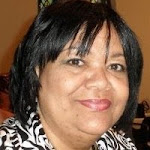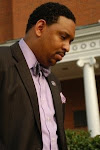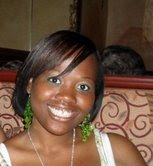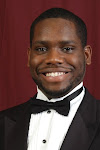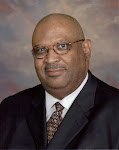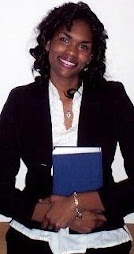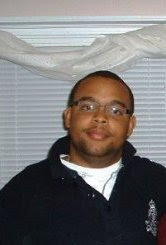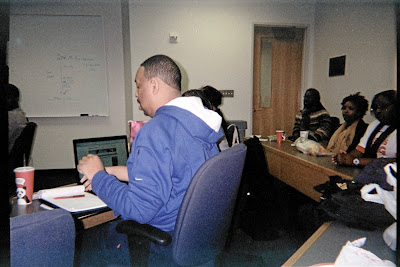
Wednesday, December 2, 2009
Tuesday, November 24, 2009
The Black Chronicles: History of African Americans and the Black Seminarians Union

As we gear up for the 40th anniversary of the Black Seminarians Union and Black History Month, we will highlight events and important dates in history that are significant to Black identity and the Black church.
On November 24:
(1897)* J.L. Love patents the Pencil Sharpener.
(1865)* Mississippi passed the so-called "Black Codes" that barred blacks from jury service, testifying against whites in trials, being armed and attending white schools.
BSU (1969)- The Office of Black Church studies came out of the Black Seminarians Union which was founded in the fall of 1969.
*Courtesy to www.blackfacts.com
ChristWorld: Seeing Christ in the World
This new section of the BSUBlog, "ChristWorld," will highlight both recent and historical events that involve the influence of Christ (and Christianity) in the world. Here is a clip from CNN.com covering an issue that is happening in Italy. Crosses are displayed in public places in Italy and now the Christian symbol is being contested.
What does this say about the cultural impact that Christianty has had on Italty and in comparison to America? In analysis, what does this say about the Black Church's embrace of the cross in its community?
What does this say about the cultural impact that Christianty has had on Italty and in comparison to America? In analysis, what does this say about the Black Church's embrace of the cross in its community?
Monday, November 23, 2009
Wrapping Up 2009, Gearing Up for 2010
We have been blessed to see another year. 2009 was a year full of history, miracles and also suffering. As we close 2009, we look forward to great things to come in 2010. Here are some of the things we are expecting:
-The 40th Anniversary of the Black Seminarians Union. Please mark your calendars for February 9-11, 2010 and the whole month of February. BSU will be celebrating its legacy with the theme "Triumph and Truth." Please continue to check the blogspot for more information.
-The 2010 Samuel DeWitt Proctor Conference, Inc. Clergy & Lay Leadership Conference.
This year this conference will be held in Chicago, Illinois on February 22-25, 2010. The conference is named after the late Rev. Dr. Samuel DeWitt Proctor who was Pastor Emeritus of the Abyssinian Baptist Church of New York. He also was a part of the faculty of Duke Divinity School. This conference brings clergy and lay leaders from across the world to discuss the black church, ministry and the gospel of Jesus Christ in the 21st century.
There is more to come in the new year.

-The 40th Anniversary of the Black Seminarians Union. Please mark your calendars for February 9-11, 2010 and the whole month of February. BSU will be celebrating its legacy with the theme "Triumph and Truth." Please continue to check the blogspot for more information.
-The 2010 Samuel DeWitt Proctor Conference, Inc. Clergy & Lay Leadership Conference.
This year this conference will be held in Chicago, Illinois on February 22-25, 2010. The conference is named after the late Rev. Dr. Samuel DeWitt Proctor who was Pastor Emeritus of the Abyssinian Baptist Church of New York. He also was a part of the faculty of Duke Divinity School. This conference brings clergy and lay leaders from across the world to discuss the black church, ministry and the gospel of Jesus Christ in the 21st century.
There is more to come in the new year.

Wednesday, November 11, 2009
The Rest of the Semester
We are near the end of the semester. Some important dates to remember are:
November 24: Tuesday Divinity Classes End/Thanksgiving Recess Begins
November 30 - December 4: Reading Period
December 5 - Christmas Fellowship
December 7 - Final Examinations Begin
December 11 - Final Examinations End
November 24: Tuesday Divinity Classes End/Thanksgiving Recess Begins
November 30 - December 4: Reading Period
December 5 - Christmas Fellowship
December 7 - Final Examinations Begin
December 11 - Final Examinations End
A New School Year
The Black Seminarians Union continues to educate, inform and prepare the black students of the seminary about Christian vocation and continuing academic programs. On September 22, 2009 in the middle of the BSU Kick-Off Week, Dr. Ellen Davis, professor of Old Testament, facilitated a discussion on A Future for African Americans in Biblical Scholarship. Even though there is a small number of African Americans in Biblical Scholarship, the discussion encouraged and enlightened some students about the importance of Biblical scholarship and how it can help in pastoral ministry, theological studies and independent research.






.JPG)








.JPG)


Duke Divinity School and Office of Black Church Studies Welcomes Dr. Joy Moore

Duke Divinity School, the Office of Black Church Studies and the Black Seminarians Union welcomes Dr. Joy Moore as the Dean of the Office of Black Church Studies. Dr. Joy Moore is also the advisor for the Black Seminarians Union. We pray that her time and work at Duke Divinity School will be fruitful. This will be Dean Moore's second year at Duke Divinity School, but her first year as the Dean of the Office of Black Church Studies. Welcome Dean Joy Moore!
Lift Him Up: Campus Wide Prayer
Thursday, May 7, 2009
Monday, April 20, 2009
Christianity and My Identity: By Emma Akpan M. Div 10'
 Last Saturday, I reluctantly attended a birthday party with a friend, because I did not know the person throwing the party and I was sure that I would be one of two black people there. As expected, I was one of the two. Instead of being discouraged, I circled the room and introduced myself to those I have not met. After a couple of minutes, I entered a conversation with a first year student and he asked me whether I thought Duke was conservative or liberal. I answered, “ I feel like it’s conservative because womanism or feminism is not taught much, at least not in it’s own context.” He responded, “Yes, but there is the Gender, Theology, and Ministry Certificate.” I said, “But the only people that would be exposed to those issues would be the ones interested in it anyway. Not everyone has the chance to learn it.” I continued to tell him why I thought Duke Divinity School was conservative, and ended with the argument saying “feminism, is my thing.” He rebutted. “My thing is Christianity !”
Last Saturday, I reluctantly attended a birthday party with a friend, because I did not know the person throwing the party and I was sure that I would be one of two black people there. As expected, I was one of the two. Instead of being discouraged, I circled the room and introduced myself to those I have not met. After a couple of minutes, I entered a conversation with a first year student and he asked me whether I thought Duke was conservative or liberal. I answered, “ I feel like it’s conservative because womanism or feminism is not taught much, at least not in it’s own context.” He responded, “Yes, but there is the Gender, Theology, and Ministry Certificate.” I said, “But the only people that would be exposed to those issues would be the ones interested in it anyway. Not everyone has the chance to learn it.” I continued to tell him why I thought Duke Divinity School was conservative, and ended with the argument saying “feminism, is my thing.” He rebutted. “My thing is Christianity !”With this statement, I felt that he was implying that Christianity was not my priority because of my interest in issues with women and women of color. He was asking me to choose one, either Christianity, or womanism. This led me to an important question. When thinking about identity, should one be able to distinguish between their Christian identity and other identities, such as race, gender, socioeconomic status, or ethnicity? If so, how does one choose?
Last week in Christian Theology with Dr. J Kameron Carter, we were discussing the Eucharist and baptism. He juxtaposed identity and politics with the Eucharist and baptism, arguing that our identity begins with our baptism. Baptism is the “death, to the economic, power, and political structure of things.” After we are baptized, all of our identities, race, gender, or otherwise do not exist. However, at the beginning of the course, Carter began with the argument that racial classification comes from a grave theological mistake that suggested that the Christianization and baptism of enslaved Africans was directly tied to their new identity as Black, because Christianity oversaw colonialism and enslavement. In this instance, baptism was the catalyst of identities outside of Christianity. Enslaved Africans were, in a sense, baptized into Blackness.
During the Pilgrimage trip to Brazil, (summer 2008), our group visited the Mercado Modelo, a very old marketplace in Salvador, Bahia. We entered the dungeon of the Mercado, the very same place where enslaved Africans were brought until someone wanted to buy them upstairs on the main level. In the Mercado, we saw small statues of the Catholic saints, which was for some Africans their first encounter with Christianity. In this moment, we witnessed how Christianity oversaw enslavement.
Generations later, many Afro-Brazilians identified themselves as Catholic, but they were Afro-Brazilian by nature of their skin color and economic status. However, it doesn't matter what their religion is, because their skin color most of the time determines what type job they have, what their education level is, and how they are perceived by others around them.
So, to say that we are all baptized into one identity-----our identities----Black, White, Latino, man, woman, or other---- is not accurate because of our identity in Christ. Our complex identity seems to ignore the fact that we still live in this world of injustice based on skin color, gender, and sexuality. It not only ignores it, but we are also encouraged to choose between our Christian identities and other important identities. If we were all one identity in Christ, there would be no racial or economic hierarchies.
For example, when people look at me they cannot see my Christianity and forget about my Blackness or my womanhood. Naming myself as a womanist caused someone to imply that Christianity was not my primary concern, but that's not true. So the question I guess I am addressing is this: Can one choose between their Christian identities and other identities? I do not think we can. Being a Black woman prompts me to speak to injustice, especially when injustice is based on identity. Being a Christian prompts me to model justice after Jesus. I cannot choose between my identities, however, I will use all of them to speak for those who have been silenced thus far.
Wednesday, April 8, 2009
Saturday, April 4, 2009
Friday, April 3, 2009
Traces of the Trade photos


The Black Seminarians Union with co-sponsors of Student Services, the Dean's Office, and the Office of Black Church Studies premiered a documentary showing of Traces of the Trade; A Story from the Deep North. We learned about one film-maker who discovers her New England ancestors were the largest slave-holding family in US history and in the process, gains a powerful perspective on the black/white divide. The guest speakers, Dain and Constance Perry, led a thought provoking discussion on the piece. Students also openly expressed their deepest feelings about the film, and their experience with race.
About Constance and Dain:
Constance is a self-employed national consultant, working in economically disadvantaged communities specializing in workforce and community development, and is a skilled trainer and facilitator. She is an active member of the Episcopal Church and sits on a number of diocesan committees. Although born and raised in Boston, Constance is a descendant of slaves in North Carolina. She and her husband, Dain Perry, live in Boston, and work together as a team to bring the film to Episcopal congregations and dioceses, as well as to schools.
Dain participated in the documentary along with his brother, Jim, and nephew, James (below). He grew up in Charleston, South Carolina. He now lives in Boston and is recently retired. During the 1970s, he worked for a non-profit agency that promoted reform in the criminal justice system, particularly prison reform. Dain has been a member of his church vestry and has been an active volunteer in his community for many years, including serving on the boards of several nonprofit organizations.
The event was held at Duke Divinity School on Wednesday, January 21, 2009 5:00 PM - 8:00 PM in Westbrook 0016
Wednesday, March 25, 2009
Hollywood be thy Name: Panel discussion on gender and faith in film
 Kamille William's discussion of Christian films:
Kamille William's discussion of Christian films:
"It is not enough to simply say "let it go" and instantly be free! Some things have to be dealt with and I think this message of getting over it, loosing it, and forgetting the past is a way of escaping accountability. Jakes and Perry are teaching hasty grace. According to David Augsburger, hasty grace is reconciliation that seeks to deal with a history of violence by suppressing the memory, denying the injury, and rewriting the violent reality with the rationale of beginning afresh.
Perpetrators welcome a hurried forgiveness that lets bygones be bygones. Such reconciliation trivializes and ignores the oppressive situation by ignoring its causes. Sometimes I have to wonder if trying to keep this appearance of unity is helping us or hurting us. Jakes and Perry started off in the right direction but ultimately end up perpetuating the very thing they are fighting against, which is the distortion of the image of Black people.
I think that on both sides there needs to be a willingness to listen to oneanother. In all the music, plays, movies, books and television shows both sides are communicating a message. If we can just get past the anger and listen to one another then the key to the reconciliation can be found. Thereis truth to be found in the work of T.D. Jakes and Tyler Perry, but there is also truth to be found in the work of Terry McMillan, Alice Walker, and Toni Morrison. We must be willing to set aside our anger and try to faithfully hear both perspectives. But this is difficult because the truth is there is not enough respect of each other in the Black community. We do not see each other as all being created in the image of God. We see each other as competition. "
Women's History Month Celebration of Women's History Month, Women's Center and Black Seminarians Union presented:
Hollywood Be Thy Name: A Panel Discussion of Depiction of Gender and Faith in Christian Films A Discussion of Tyler Perry and his plays.
Tyler Perry is a popular Black filmmaker and playwright writing on issues such as marriage, infidelity, drug abuse, and abandoned children, in the context of a Christian family.
Clips of movies were viewed.
On this panel, three Divinity School students which included: Kamille Williams, 3rd year, MDiv.CJ Rhodes, 3rd year MDiv, and Joseph Edmonds, Ph.D Candidate Religion, critically examined several of Perry films. Refreshments were served.
The event was held on Wednesday March 25, in room 0013w.
Sunday, February 22, 2009
Black History Month Lectures

Dr. Robin D.G. Kelley, one of America's most thought-provoking academics, lauded by Cornel West as "the preeminent historian of black culture writing today," presented a lecture on Jazz and Spirituality with multi-media images and audio of great Jazz musicians. Dr. Kelley is a Professor of American Studies and Ethnicity and History at USC, and a visiting Professor at Duke University. In the lecture, Dr. Kelley engaged the music of John Coltrane as well as several other modern jazz artists.
On Wednesday, Feb 25, 2009, Dr. Willie Jennings and Dr. Chuck Campbell engaged a fully packed room of students in a brownbag discussion on the practice of Jazz improvisation in the disciplines of Theology and Preaching. Favorite Jazz pieces of the presenters were played. Dr. Jennings discussed the works of Branford Marsalis as well as Cyrus Chestnutt. Dr. Campbell encouraged students to express their skills through preaching. The event was held in 0015W of the divinity school.
Subscribe to:
Comments (Atom)


